
"Do Not Go Gentle Into That Good Night" Sticker for Sale by AlanPun Redbubble
In "Do not go gentle into that good night," Thomas creates tension between death—which he speaks about symbolically through images of night and darkness—and life, which he represents through images of light. For example, take a look at the second line of the poem. When Thomas says "close of day," he's referencing death.
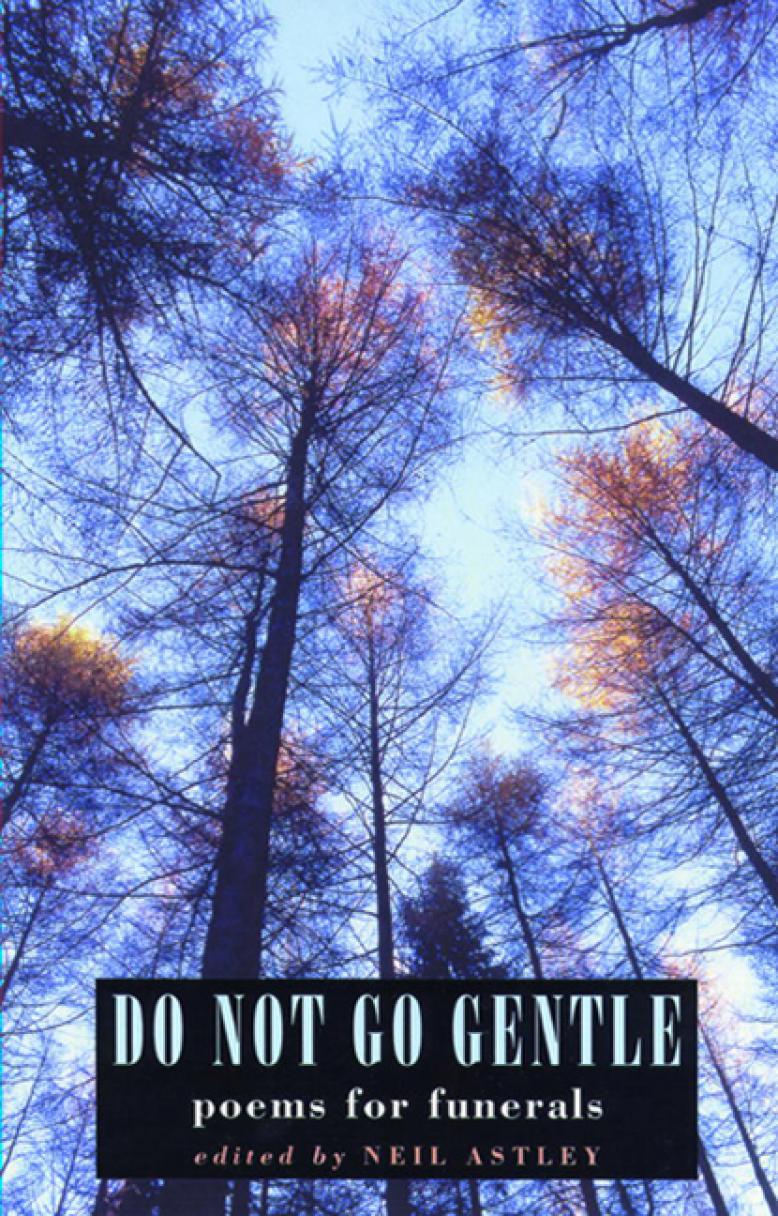
Do Not Go Gentle Bloodaxe Books
Do not go gentle into that good night. Grave men, near death, who see with blinding sight. Blind eyes could blaze like meteors and be gay. Rage, rage against the dying of the light. And you, my.
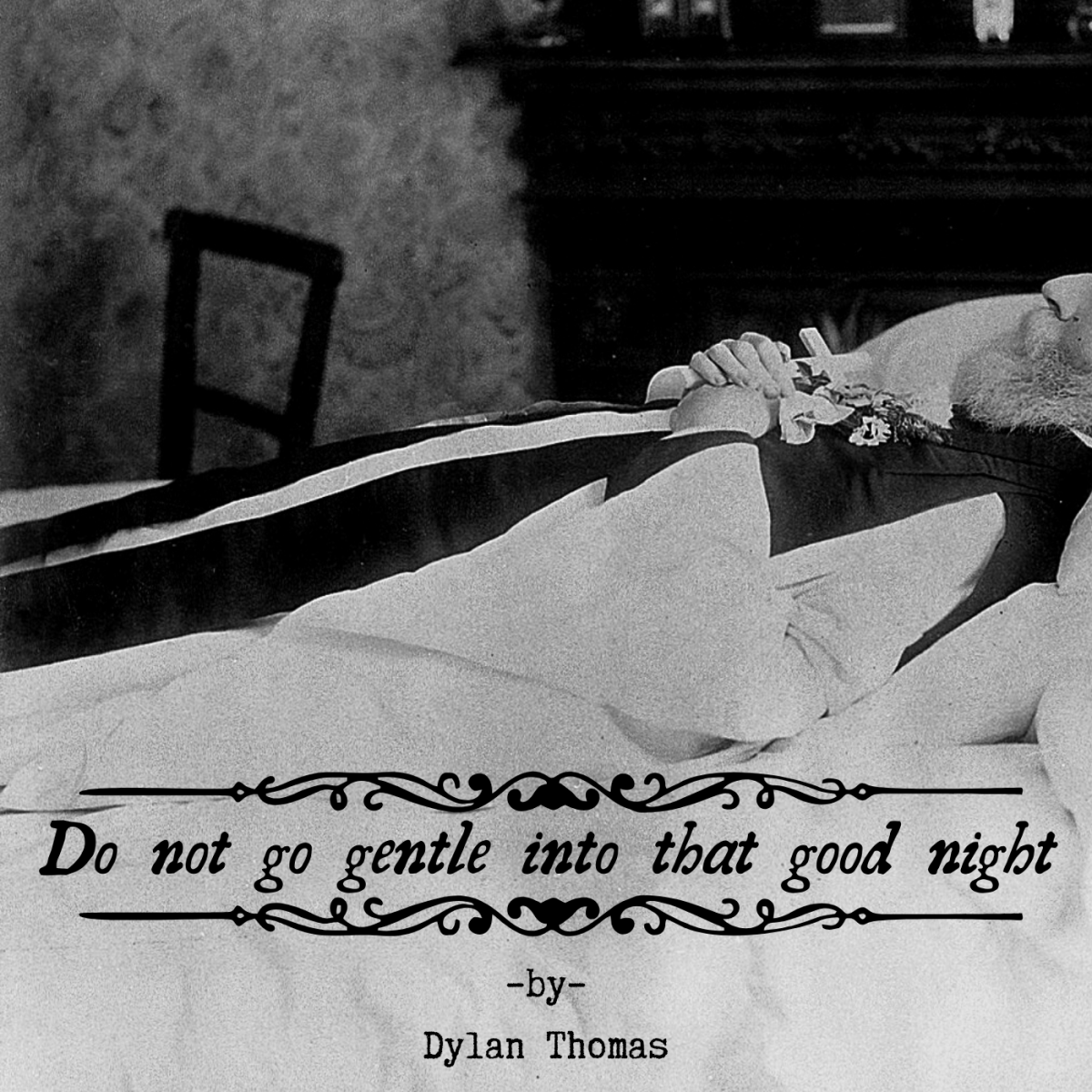
An Analysis of "Do not go gentle into that good night" by Dylan Thomas Owlcation
1953. Do not go gentle into that good night, Old age should burn and rave at close of day; Rage, rage against the dying of the light. Though wise men at their end know dark is right, Because their words had forked no lightning they. Do not go gentle into that good night. Good men, the last wave by, crying how bright.
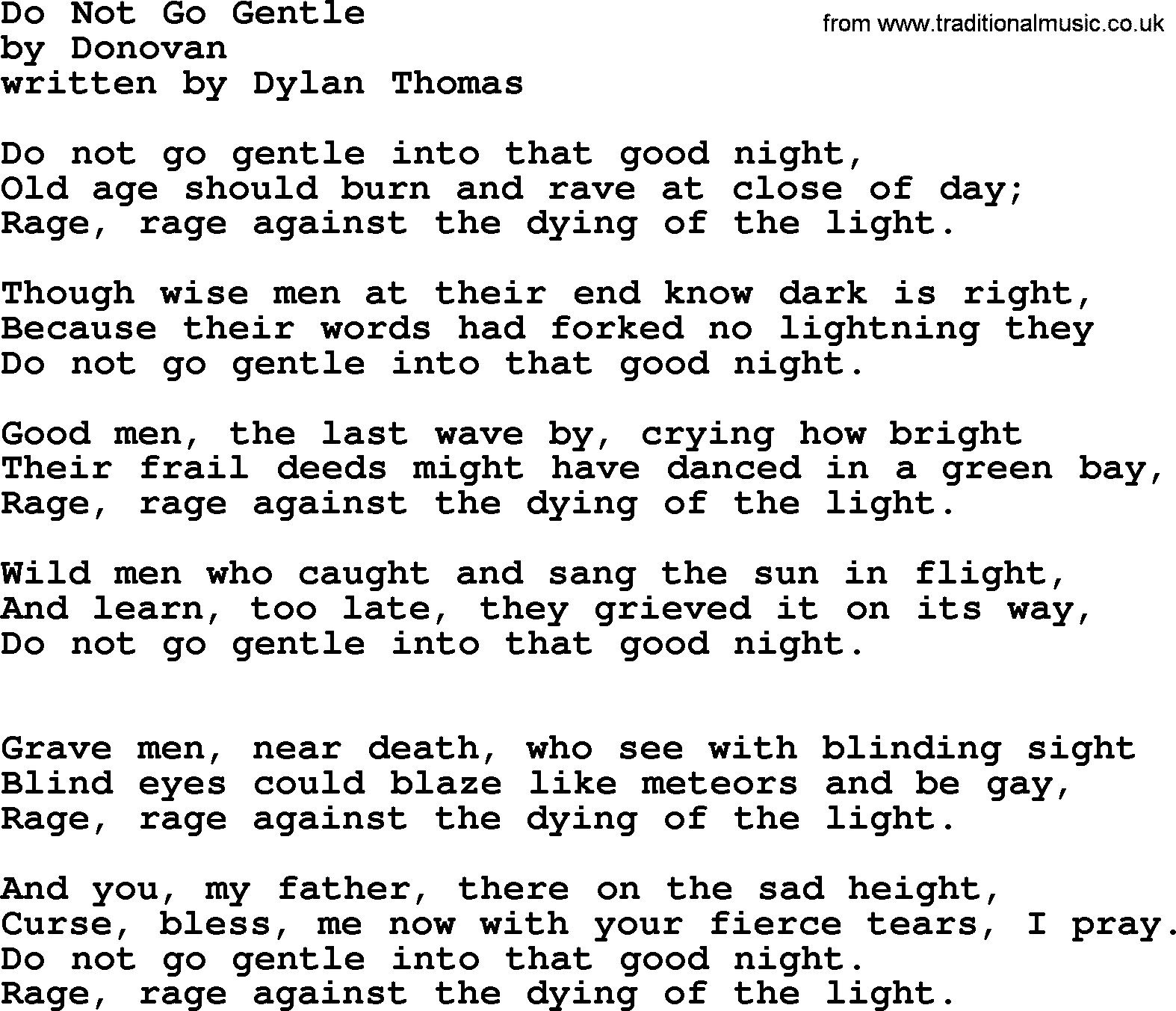
Donovan Leitch song Do Not Go Gentle lyrics
Origin of Do Not Go Gentle into That Good Night. This phrase appears four times in Thomas Dylan's best-known villanelle poem Do Not Go Gentle into That Good Night.The speaker opens the poem with this phrase, saying, "Do not go gentle into that good night, / Old age should burn and rave at close of day; / Rage, rage against the dying of the light." ." The speaker urges his father to.
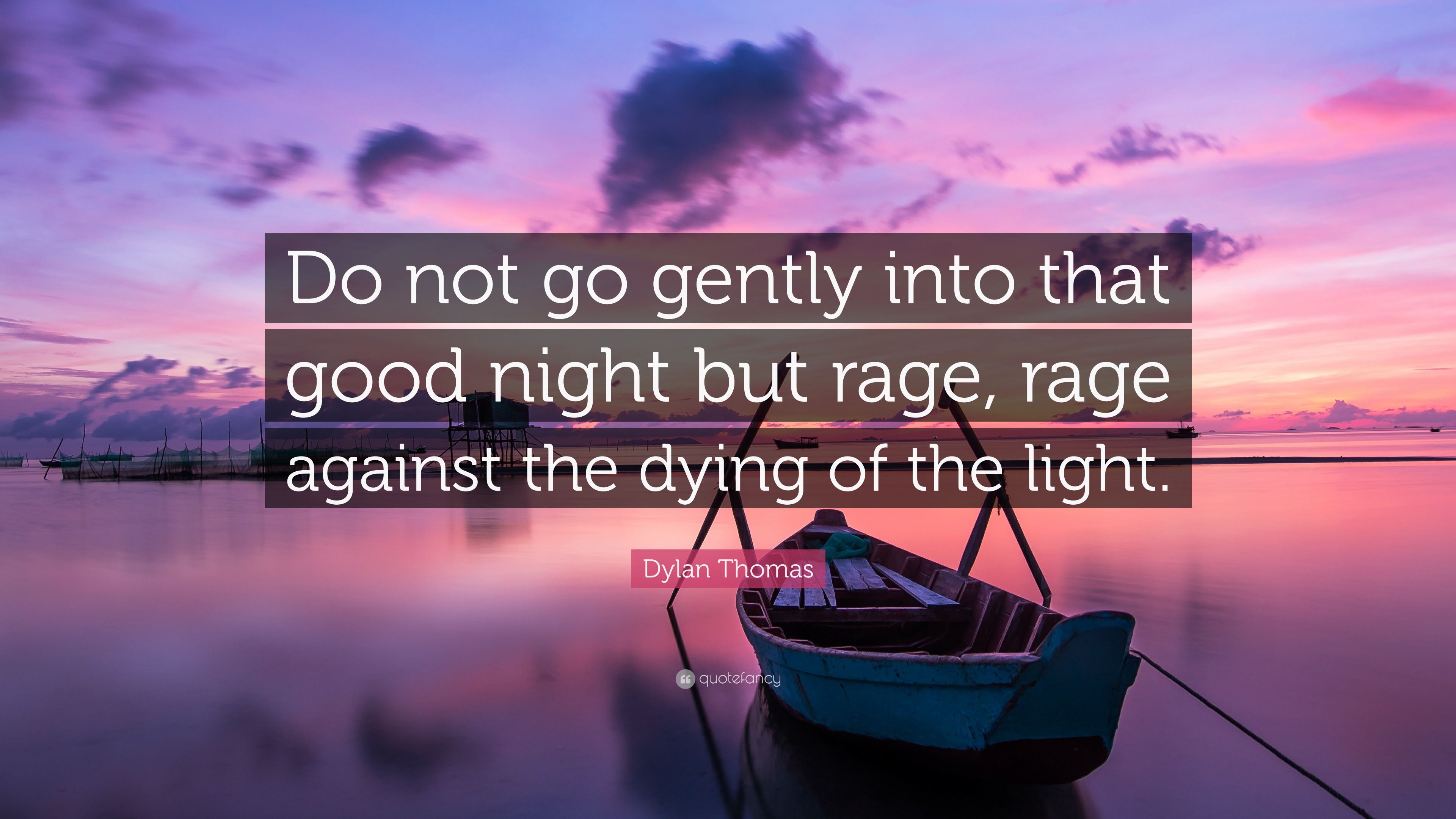
Dylan Thomas Quote “Do not go gently into that good night but rage, rage against the dying of
1914 -. 1953. Do not go gentle into that good night, Old age should burn and rave at close of day; Rage, rage against the dying of the light. Though wise men at their end know dark is right, Because their words had forked no lightning they. Do not go gentle into that good night. Good men, the last wave by, crying how bright.

Book giveaway for Do Not Go Gentle by C.A. Larmer Feb 08Mar 08, 2017
Do not go gentle into that good night, Old age should burn and rave at close of day; Rage, rage against the dying of the light. Though wise men at their end know dark is right, Because their words had forked no lightning they. Do not go gentle into that good night. Good men, the last wave by, crying how bright.

Book Review Quick Reads, Do Not Go Gentle by Phil Carradice Changing Pages
Wild men who caught and sang the sun in flight, And learn, too late, they grieved it on its way, Do not go gentle into that good night. Grave men, near death, who see with blinding sight. Blind eyes could blaze like meteors and be gay, Rage, rage against the dying of the light. And you, my father, there on the sad height, Curse, bless, me now.

"Do Not Go Gentle Into That Good Night..." Dylan Thomas Dylan thomas, Quotes, Dylan
In Thomas's poem, the first refrain is, "Do not go gentle into that good night" (lines 1, 6, 12, and 18), and the second is, "Rage, rage against the dying of the light" (lines 3, 9, 15, and 19). Each of these refrains expresses a similar sentiment. Regardless of whether death is figured as "that good night" or "the dying of the.

Do Not Go Gentle Into That Good Night Rage Against the Dying Etsy
Ultimately, 'Do not go gentle into that good night' is a poem that attempts to describe the author's complex relationship with his own mortality. This is certainly one of the most complex emotions an artist can attempt to describe in their work, and yet 'Do not go gentle into that good night' remains one of Thomas's most famous.
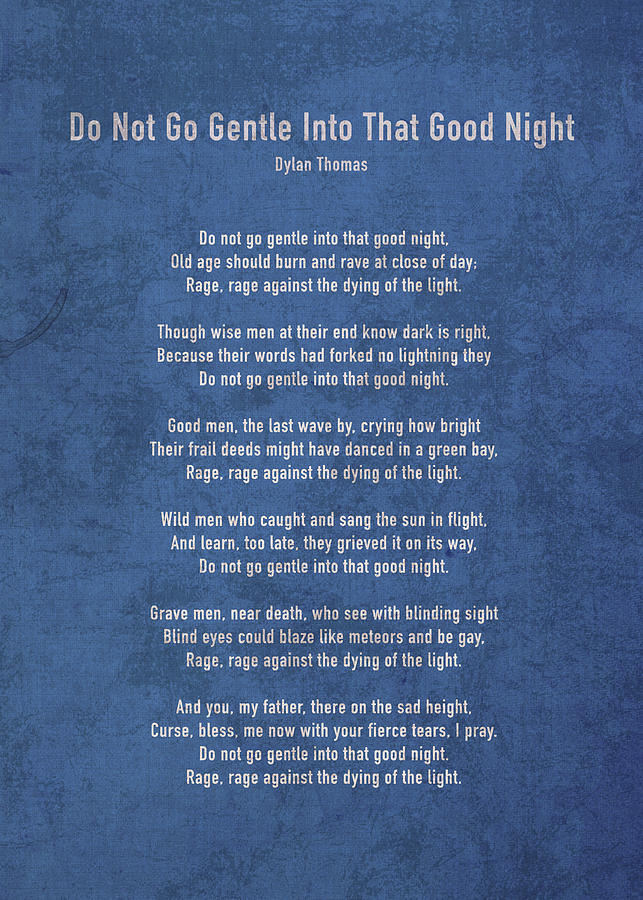
Do Not Go Gentle Into That Good Night by Dylan Thomas Poem Quote on Blue Vintage Canvas Mixed
Get LitCharts A +. "Do Not Go Gentle Into That Good Night" is a poem by the Welsh poet Dylan Thomas, first published in 1951. Though the poem was dedicated to Thomas's father, it contains a universal message. The poem encourages the dying—the sick and the elderly—to fight bravely against death.

DO NOT GO GENTLE INTO THAT GOOD NIGHT Poster monique Keep CalmoMatic
Buy Now. "Do not go gentle into that good night" is a villanelle written by the Welsh poet Dylan Thomas in 1951. With this poem, Thomas pretty much single-handedly revived the villanelle, which had first emerged in 17th-century France and reached the apex of its popularity in the British 1890s. As a highly structured poetic form, the.

Do Not Go Gentle Dylan Thomas Poster Weisheiten, Zitate, Dylan thomas
Do not go gentle into that good night analysis - 1st stanza. Do not go gentle into that good night, Old age should burn and rave at close of day; Rage, rage against the dying of the light. The first stanza lays out what might as well be the poem's thesis—that despite the inevitability of death, it should be resisted right up until the end.
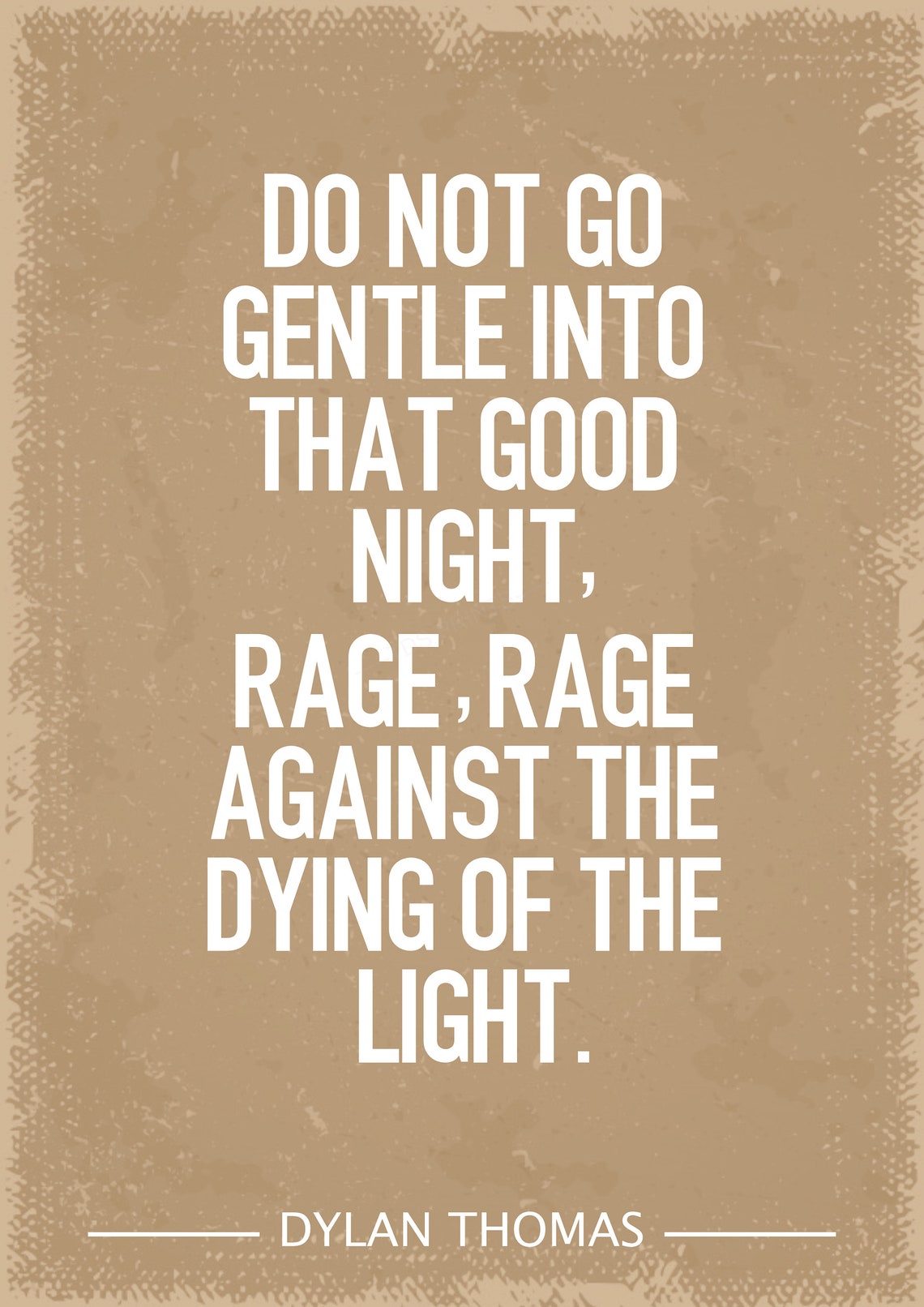
Dylan Thomas Do Not Go Gentle Into the Night Art Print Etsy
It's no accident, surely, that Dylan Thomas's "Do not go gentle into that good night" is a poem which is read at two out of every three funerals. We respond to the sense in that poem, as in so many others, that the verse engine is so turbocharged and the fuel of such high octane that there's a distinct likelihood of the equivalent of.
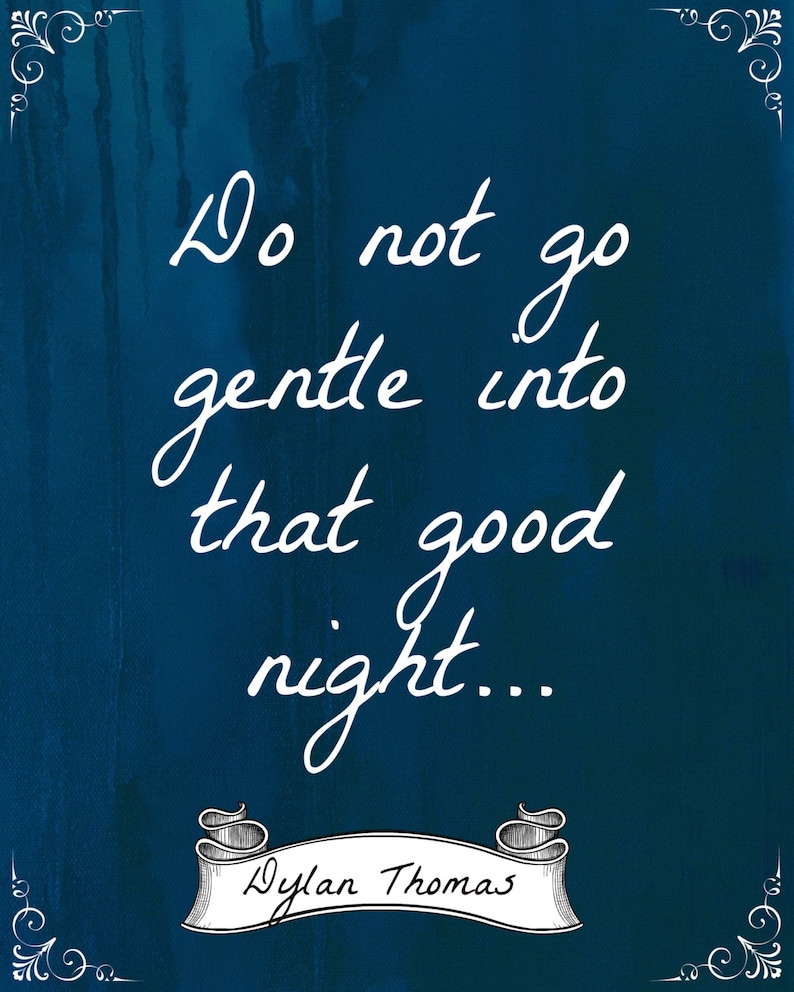
Dylan Thomas Do Not Go Gentle into That Good Night Poem Quote Etsy
The poem "Do not go gentle into that good night," published in 1951 by Dylan Thomas, is a son's plea to his dying father. The speaker seeks to show his father that while all men face the same end, they must fight for life nonetheless. This article includes a discussion of the poem's meaning, an examination of its structure and poetic.
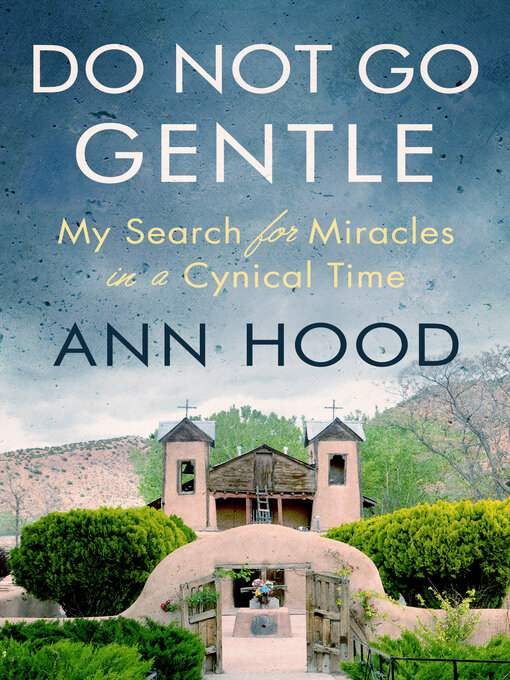
Do Not Go Gentle New York Public Library OverDrive
Do not go gentle into that good night. " Do not go gentle into that good night " is a poem in the form of a villanelle by Welsh poet Dylan Thomas (1914-1953), and is one of his best-known works. [1] Though first published in the journal Botteghe Oscure in 1951, [2] the poem was written in 1947 while Thomas visited Florence with his family.
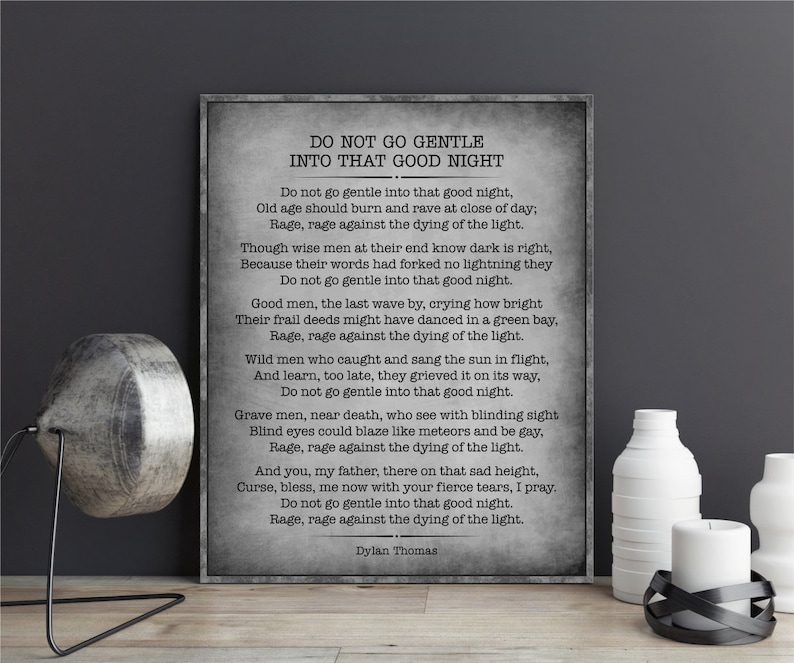
Dylan Thomas poem print quote do not go gentle into that good Etsy
Perhaps because as an adjective, "gentle" can be used to describe Thomas's "kind" father, could even be an epithet for him. So when Thomas says, "Do not go gentle into that good night," a translation might be, "Do not go, gentle father, into that final goodbye," or "Do not die father, do not accept death.". In the end, if.